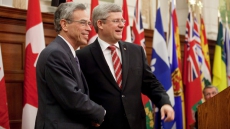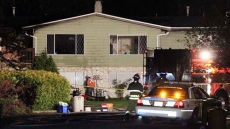VANCOUVER — A Vancouver man slashed in the head outside a church — in an attack that led to a suspect being shot dead by police — says he's having nightmares and isn't getting enough support.
Kathiye Elmi, 40, lifts his hat to reveal stitches on his head and recalls the violent scuffle.
"He came after me. And then I faced him. I don't want him to stab me in the back," Elmi told reporters Monday.
"Everybody screamed, 'Watch out the knife!"
Police have said a man was wildly stabbing people two weeks ago outside the First United Church in the city's impoverished Downtown Eastside.
Officers first shot him with bean bags, but he turned his knife on a woman.
An officer then fired his gun. Abdi Hirsi, 26, of Edmonton died at the scene.
The woman was seriously injured in the attack, but now is out of hospital. Two others were also wounded.
Elmi said he was interviewed by as many as five police officers after the attack, but hasn't been helped by victims' services.
"I'm speaking out, (because) I thought I'm living in a safe country — a place I came to have a good life, not to get stabbed," said Elmi, who immigrated from Mogadishu 22 years ago.
"I need more protection and I need a life."
Jean Hakizimana, who founded the black advocacy group Neighbourhood Care International, said he's reached out to city and provincial officials on Elmi's behalf, but hasn't received support. He didn't specify whom he had contacted.
He alleged that language barriers, skin colour and poverty are hurdles in getting the man adequate care.
"We are looking for an office or a place ... (where) a black man and African man can go and cry," Hakizimana said.
"It's not very easy to be a black man in Vancouver. Especially when you have don't have a job, a family."
Elmi also has a criminal record for assault and theft convictions. He said he was fighting in self-defence and stole a keg of beer.
A Vancouver police spokesman wouldn't comment about a victim of any crime. But Sgt. Randy Fincham said a person's race and background would not be factors.
"They would be treated first and foremost as a victim," he said in an email.
The Vancouver police victims' services website says officers at the scene of a crime typically refer people to victims' support, but an individual can also call.
A spokesman for the province's justice ministry said it would not publicly discuss any case for privacy reasons. It lists 160 victims' service programs throughout the province and notes a toll-free, 24-hour hotline provided in 110 languages.





